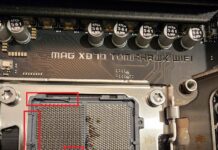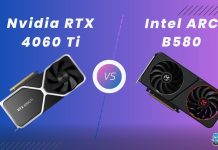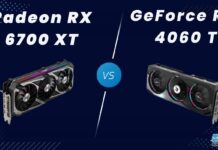AMD Ryzen 7 9800X3D Rated: 9.3/10 AMD Ryzen 9 7900X3D Rated: 9.1/10
Pros And Cons
| CPU | Pros | Cons |
|---|---|---|
| AMD Ryzen 7 9800X3D | ✅ 96MB of L3 Cache ✅ Improved overclocking potential | ❌ Inferior core and thread count |
| AMD Ryzen 9 7900X3D | ✅ Enhanced gaming performance ✅ Improved power efficiency | ❌ Less efficient in temperature management |
Comparison Table
| Feature | AMD Ryzen 9 7900X3D | AMD Ryzen 7 9800X3D |
|---|---|---|
| No. of Cores | Total: 12 | Total: 8 |
| No. of Threads | 24 | 16 |
| Base Clock | 4.4GHz | 4.7GHz |
| Boost Clock | Max Turbo: Up to 5.6GHz | Max Turbo: Up to 5.2GHz |
| Integrated Graphics | AMD Radeon Graphics | AMD Radeon Graphics |
| Best Motherboard | BEST Motherboards For Ryzen 9 7900X3D | Best Motherboard For Ryzen 7 9800X3D |
| Best RAM | Best RAM For Ryzen 9 7900X3D | Best RAM For Ryzen 7 9800X3D |
| Best Cooler | Best CPU Coolers For Ryzen 9 7900X3D | Best CPU Cooler For Ryzen 7 9800X3D |
| Processor Review | AMD Ryzen 7 9800X3D |
Architectural Differences
- Core Count: Firstly, the Ryzen 7 9800X3D packs 8 cores and 16 threads, while the Ryzen 9 7900X3D steps it up with 12 cores and 24 threads.
- Clock Speed: Moving onto speeds, the 9800X3D runs at a base clock of 4.7 GHz, boosting up to 5.2 GHz, whereas the 7900X3D starts at 4.4 GHz and can reach up to 5.6 GHz.
- Cache: In the cache department, the 9800X3D features 104MB of cache (8MB L2 + 96MB L3), and the 7900X3D offers 140MB (12MB L2 + 128MB L3).
- Process Node: The 9800X3D is built on a 4nm process, while the 7900X3D uses a 5nm process, showcasing the more advanced technology on the former.
- TDP: When it comes to power draw, both the processors have a Thermal Design Power (TDP) of 120W.
The X3D chips from the 9000 series have recently appeared in the market and are already garnering massive attention due to their infamous performance standards. In this article, I will test the Ryzen 7 9800X3D Vs Ryzen 9 7900X3D to see which one comes out on top.
Gaming Benchmarks – 2160p
To keep things fair and accurate, both of these chips will be tested across a number of games at 4K resolution and the same testing rig to find out their difference in performance when it comes to gaming benchmarks. Let’s get started.
Test Bench
- OS – Windows 11
- CPU Cooler – Enermax LiqMaxFlo 360mm
- Graphics Card – GIGABYTE RTX 4090 Gaming OC 24G
- SSD – XPG Gammix S50 Lite
- Power Supply – be quiet! Dark Power Pro 13 1300W
- Mobo (AMD) – ASRock X870E Taichi Lite
God of War

- Playing God of War on the Ryzen 7 9800X3D, I noticed an average of 141 FPS, while the 7900X3D lagged behind at 124 FPS. That’s about a 12.8% increase with the 9800X3D, which gave it a smoother feel overall.
- For those pesky frame drops, the 9800X3D held up better, sticking around 80 FPS versus the 7900X3D’s 75 FPS a modest 6.4% difference. It’s not a massive change, but enough to make things feel a bit more stable.
Cyberpunk 2077

- Cyberpunk 2077 felt noticeably smoother with the Ryzen 7 9800X3D, reaching 93 FPS compared to just 74 FPS on the 7900X3D. That’s a solid 22.7% boost, which makes a difference when you’re racing through Night City.
- The 1% lows really highlight the 9800X3D’s advantage of 75 FPS versus the 7900X3D’s 50 FPS, giving a 40% improvement. Those dips did less stuttering, keeping the game fluid even in intense moments.
Assassin’s Creed Valhalla

- In Valhalla, the 9800X3D pushed out 131 FPS while the 7900X3D managed 106 FPS, about a 21% difference. That extra boost helped a lot in crowded areas, making the game feel more immersive.
- The 9800X3D held a steadier baseline too, with 1% lows at 105 FPS compared to 87 FPS on the 7900X3D, a roughly 18.7% increase. Those minor drops were barely noticeable, even in intense action sequences.
Watch Dogs Legion

- With Watch Dogs Legion, I got 123 FPS on the Ryzen 7 9800X3D versus 102 FPS on the 7900X3D, an 18.6% bump. This extra power was noticeable in the fast-paced car chases and kept things feeling sharp.
- The 1% lows were also stronger on the 9800X3D, holding around 107 FPS compared to 89 FPS on the 7900X3D (around an 18.3% gain). It really made a difference when dashing through busy parts of the city.
Red Dead Redemption 2

- Red Dead Redemption 2 was especially smooth on the 9800X3D, hitting 142 FPS compared to the 7900X3D’s 116 FPS, or about 20.1% more frames. This made roaming through the stunning open world feel even more seamless.
- In those unpredictable moments like big gunfights or fast action scenes the 9800X3D held its ground with 1% lows around 106 FPS, whereas the 7900X3D dropped to 75 FPS, a big 34.2% difference.
Horizon Zero Dawn

- On Horizon Zero Dawn, the 9800X3D ran at an average of 139 FPS, compared to 123 FPS on the 7900X3D, giving about a 12.2% edge. This boost added a bit more smoothness to the gorgeous landscapes and intense battles.
- The 1% lows on the 9800X3D hit around 103 FPS, compared to 92 FPS on the 7900X3D a decent 11.2% difference. This consistency made the gameplay feel less choppy, even in dense, foliage-heavy areas.
Productivity Benchmarks
Now that the gaming section has been covered, let’s move on to the productivity scales and see how these processors hold up against each other across a number of different benchmark tests.
Cinebench R24

- The Ryzen 7 9800X3D pulled a score of 133 in Cinebench R24 single-core, while the Ryzen 9 7900X3D came in slightly lower at 122. That’s an 8.6% edge with the 9800X3D, giving it a slight bump in single-threaded tasks.
- But the 7900X3D takes the lead in multi-core performance here, scoring 1596 compared to the 9800X3D’s 1318 a solid 19% advantage. This higher multi-core performance on the 7900X3D would be helpful for intensive workloads.
Geekbench 6

- In Geekbench’s single-core test, the Ryzen 7 9800X3D delivered a score of 3307, while the Ryzen 9 7900X3D only managed 2235. That’s a pretty significant 38.6% increase for the 9800X3D, which translates to snappier performance.
- Both processors are pretty close in multi-core here. The 9800X3D scored 18,223, and the 7900X3D was just a touch behind at 17,857, a minor 2% difference. But the 9800X3D did edge out slightly in multi-threaded workloads as well.
iGPU – FP32 Performance

- Both processors scored identically in the FP32 performance test at 564. No difference here both handle this benchmark with equal efficiency.
Overall Performance
Average Framerate
After completing the gaming benchmarks, the 9800X3D can be easily crowned as the victor as it not only provides a significant 17.5% advantage in overall performance but beats the 7900X3D in every game we tested with a comfortable margin.
1% Lows
Similar to the average FPS, the 1% paints a similar picture as I saw the 7900X3D provides a 20.6% more stable gaming performance and lower FPS dips when compared to the 7900X3D showcasing the advantage of the newer gen’s technological advancement.
Productivity
Finally, going over the productivity benchmarks both processors were closely tied, with one taking the lead over the other under different tests. But I will give a slight edge to the 9800X3D as it provides close performance and belongs to the latest generation.
Thermal Efficiency
| Game | Ryzen 9 7900X3D (°C) | Ryzen 7 9800X3D (°C) |
|---|---|---|
| God of War | 73 | 80 |
| Cyberpunk 2077 | 75 | 92 |
| Assassin's Creed Valhalla | 74 | 79 |
| Watch Dogs Legion | 71 | 80 |
| Red Dead Redemption 2 | 72 | 84 |
| Horizon Zero Dawn | 75 | 89 |
| Average Thermal Statistics | 73.3🌡️ | 84🌡️ |
| Winner: AMD Ryzen 9 7900X3D | ||
In terms of thermal efficiency, my testing showcased the 7900X3D to be performing better than the 9800X3D. On average the former ran 13.5% cooler than its competition which could be due to the performance capabilities of the new chip.
Price
| CPU | Ryzen 9 79000X3D | Ryzen 7 9800X3D | Price Difference |
|---|---|---|---|
| Launch MSRP | 💲599 | 💲479 | 22.2% |
| Current Price | 💲594 | 💲479 | 21.4% |
As I researched the market for the pricing aspect, I found the 9800X3D to be 21.4% cheaper than the 7900X3D as its launch price is lower. But this can change pretty soon if the stocks run out and scalpers take advantage of the situation.
What We Recommend
AMD Ryzen 9 7900X3D: After benchmarking the 7900X3D under different situations, I can comfortably say the processor can still hold its own against a lot of the other options currently available in the market while generating less heat.
AMD Ryzen 7 9800X3D: The X3D chips have always been a powerhouse and the very same is true for the 9800X3D. It can take everything you throw at it head-on and still come out with great results which showcases the capability of this processor.
Although both processors have their advantages when compared against each other the 9800X3D takes the crown as it not only beats the 7900X3D in all gaming benchmarks but also gives it a very tough time when it comes to productivity tasks.
Yes, both processors support overclocking. Notably, the Ryzen 7 9800X3D is the first X3D processor to be fully unlocked for overclocking, allowing enthusiasts to fine-tune performance. Yes, both processors feature integrated Radeon Graphics, providing basic graphical capabilities without the need for a discrete GPU. Both the Ryzen 7 9800X3D and Ryzen 9 7900X3D support DDR5 memory. Both processors support PCIe 5.0, providing ample bandwidth for the latest graphics cards and storage solutions. Yes, both the Ryzen 7 9800X3D and Ryzen 9 7900X3D are designed for the AM5 socket, ensuring compatibility with a wide range of AM5 motherboards. FAQs
More From Ryzen 7 9800X3D More From Ryzen 9 7900X3D
Thank you! Please share your positive feedback. 🔋
How could we improve this post? Please Help us. 😔
[Comparisons Expert]
Shehryar Khan, a seasoned PC hardware expert, brings over three years of extensive experience and a deep passion for the world of technology. With a love for building PCs and a genuine enthusiasm for exploring the latest advancements in components, his expertise shines through his work and dedication towards this field. Currently, Shehryar is rocking a custom loop setup for his built.
Get In Touch: shehryar@tech4gamers.com


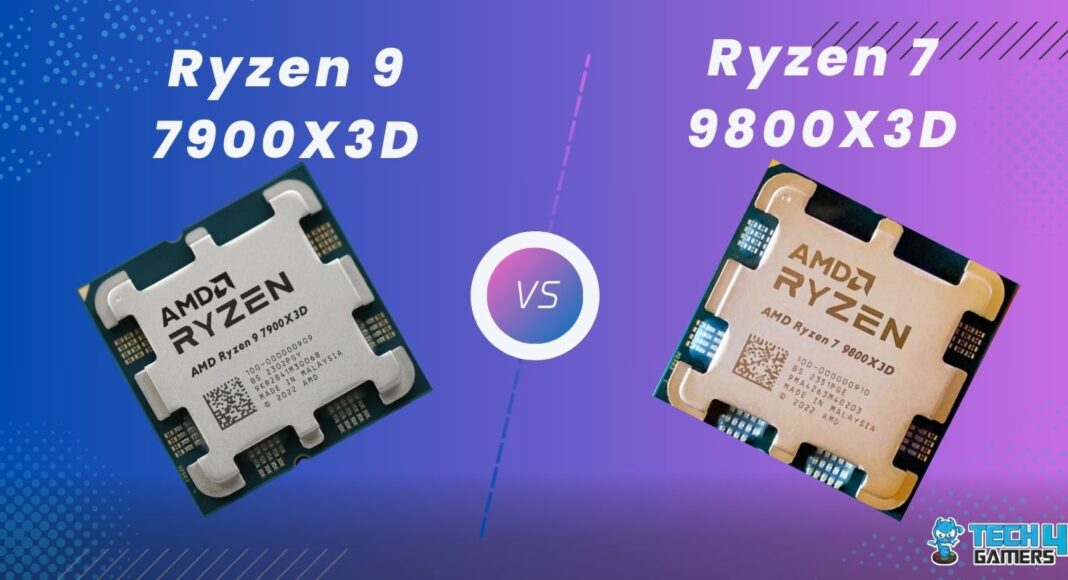
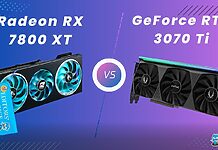
![RTX 2060 Vs GTX 1070 [We Tested 8 Games]](https://tech4gamers.com/wp-content/uploads/2023/06/GPU-Comparison-Template-NEW-1-218x150.jpg)
